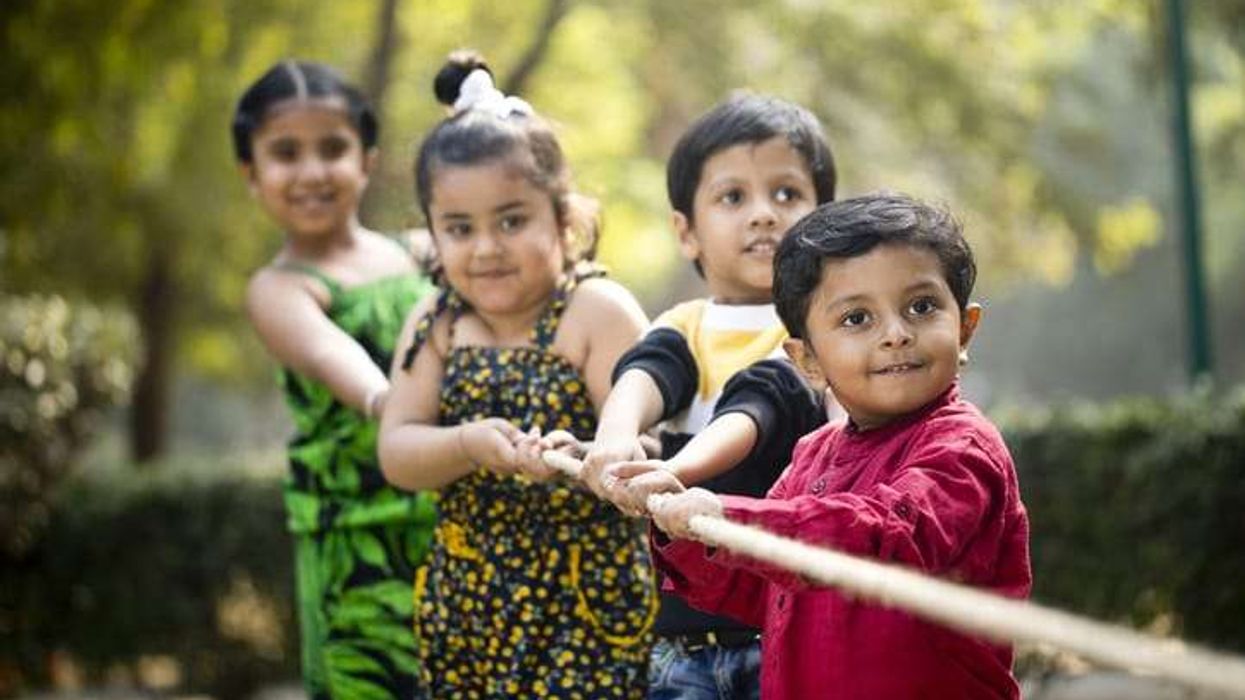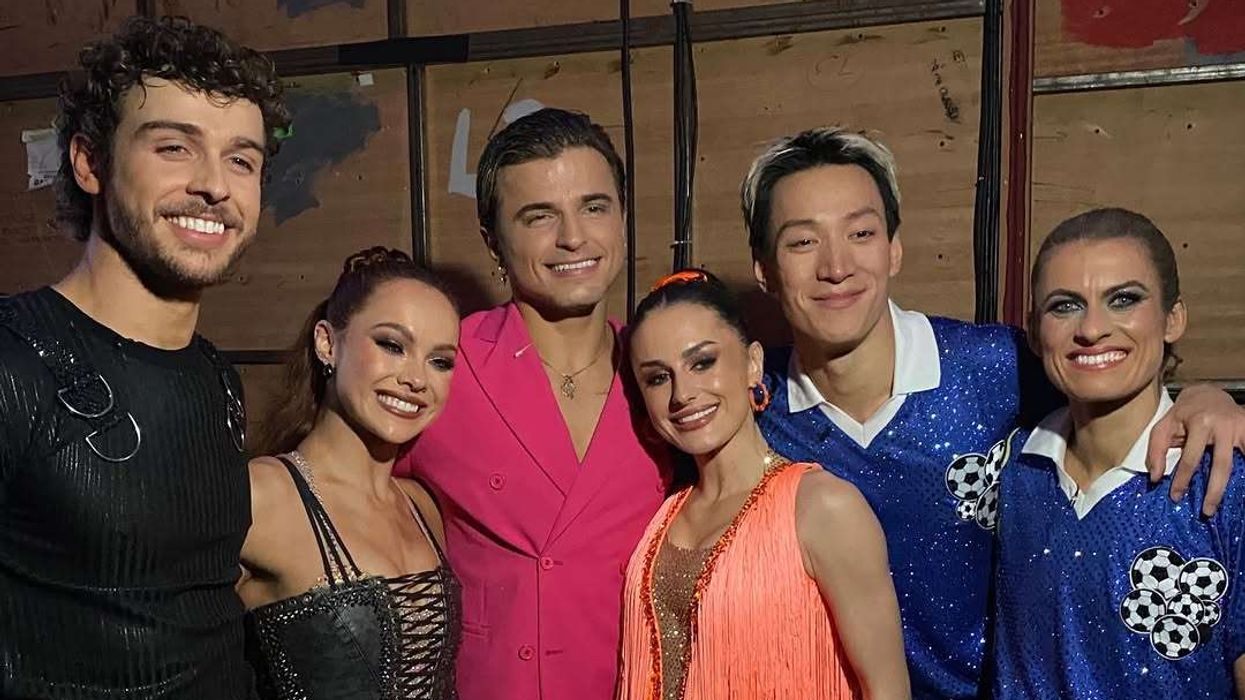THE SUCCESSFUL ACTING JOURNEY OF BRITISH ASIAN STAR MANJINDER VIRK
by ASJAD NAZIR
TALENTED actor Manjinder Virk has shown off her impressive range in a host of interesting projects including top television serials and acclaimed plays. The versatile performer has also branched into directing and today balances being a mother with a busy career.
She will be leaving her role in popular ITV serial Midsomer Murders this autumn and will
next be playing a key role in new sitcom, Bad Move on the same channel. Eastern Eye caught up with the London-based British star to talk about her action packed career, forthcoming projects, motherhood and more.
Do you remember the first time you stepped out in front of an audience?
I don’t remember the exact first time in front of an audience. It might have been when I played a witch called Maltash (a renamed Maleficent) in Sleeping Beauty. I was 11, I think. I had to sing a solo and didn’t have the best voice, so kind of spoke and sang it. I also remember another one of my school plays, Willy Russell’s Our Day Out where I played a teacher, Mrs Kay. The play is about a group of school kids in a “progress” class. I have never forgotten one of the lines, “The factories will always need their fodder.” I never really understood that until I was older, but I think that experience left a lasting impression on communicating with an audience and telling someone else’s story.
How do you look back on your acting career?
I tend not to look back at my acting career as a whole. I feel it’s one part of my creative career. There are certain experiences I look back at with real joy and loved having had opportunities to work with great people, some of whom have become great friends. I feel lucky to have played such a range of characters and be challenged as an artist/actor, but I do feel I am continuously searching and looking forward to the next project and challenge.
How does theater compare to being on screen in a project like a TV series?
Theater can be so fresh and is immediate; every night you go on a journey with a character and you hope to take the audience with you. It is thrilling when you are part of a team and part of a story you want to tell. With screen it can be very technical with set ups and scenes out of sync, but I find it can be equally rewarding when you are working on exciting scripts with actors who spar with you and directors who are visionaries.
You have done a number of acclaimed roles. Which has given you the greatest satisfaction?
In theatre I worked with Teatro Biuro Podrozy, a Polish theatre company, on the Millenium Mysteries in Coventry Cathedral. They tell unique stories through creating powerful and lasting images, sometimes using fire and water and most of them can walk on stilts. I was part of an ensemble consisting of British and Polish actors and we found an incredible bond. On screen playing Nasima, a medical student who becomes radicalised in Peter Kosminsky’s Britz remains one of the most challenging and fulfilling roles I’ve had. It was a unique experience and such a great opportunity to be able to prepare and research in such detail, to be taken out of my comfort zone.
What has the experience of Midsomer Murders been like?
I play pathologist Kam Karimore in series 18 and 19. It was a little daunting coming into
such a well loved show, but the cast, especially Neil Dudgeon, Gwilym Lee and Fiona Dolman helped me fit in and feel like part of the family. Kam was a great character to play– smart, not intimidated, but slightly torn with looking for love and staying professional. I have a lot of admiration for the writers as they create two hour standalone murder mysteries that are always inventive, original, often bizarre and funny.
What is the secret of a great performance?
Truth. An absolute commitment to what you’re doing, and who you’re playing. That applies to all genres including comedy and drama. But as a performer, some actors just have something – you can’t take your eyes off them.
Who has been the most interesting person you have worked with?
There are many, so its too difficult to chose just one, but the playwright and and
dramaturge Noel Greig was hugely inspirational to me and continues to be. Sadly he passed away in 2009, but he was the one who really encouraged me to write. He was my dramaturge on my first play GLOW, about an Asian girl boxer who lost her mother. He had an ability to focus on authenticity and gave me the tools to problem solve and keep writing what was true to me. He was unique.
What else do you have on the way?
I am in a new sitcom, Bad Move written by the written by the absolutely brilliant Jack Dee and Pete Sinclair, which will be on ITV soon. They wrote Lead Balloon together, which I was a big fan of so it was great to be in their world. It’s a real ensemble piece with very funny and talented people like Kerry Godliman, Miles Jupp, Seann Walsh, Sue Vincent, Phil Jackson and of course Jack Dee. We were constantly laughing throughout the shoot.
How do you balance being a mother with your acting projects?
It is exactly what every working parent says it is, a juggle but you always find a way if you want to. My kids are my world, but my work is also a part of me. My daughter has taken a real interest in what we (my husband, Neil Biswas is a writer and director) do. I love being able to take her on set, show her the costume and makeup trucks. She came on set for Midsomer Murders and our director Matt Carter, got her to shout “action” and do the clapperboard. She was fascinated by how the shots were set up. In fact I used them both as actors in my short film With Love from Calais.
What advice would you give working mums?
And dads. Don’t be hard on yourself, do what you can to the best of your ability, but switch off when away from work.
What would be your dream role?
For me it’s not so much a dream role as to who I would like to work with. There are so many directors it would be a dream to work with like Andrea Arnold, Paul Thomas Anderson, Ken Loach, Martin Scorsese, Ava DuVernay and Denis Villeneuve to name a few.
Is writing and filmmaking something you want to pursue further?
I have a huge passion for filmmaking and telling my own stories. I have made roughly five independent short films and each time I feel I learn something, which gives me the confidence to keep making work. I am always in the process of developing ideas.
Is it becoming easier for British Asian actors to get good roles or is it still a challenge?
I think good roles are being cast more colour blind, but the stories from diverse backgrounds aren’t equally out there. There are so many exciting new voices out there especially it feels, in the world of theatre. They need to be given equal opportunities, based on their talent. But challenges come not only from your ethnicity, they can come from being a woman, being an older actor, having children, being from any background, like working class. I think we have come to a point where we are starting to openly discuss what prevents people from succeeding in our industry and then you realise it is the case in many other professions too. But in acting you see it, you are faced with representation or the glaring lack of it.
What advice would you give aspiring actors?
Study acting and study something else.
What is the best advice you’ve ever received?
You can say no to a job.
What are your big passions away from work?
Can I say I’m passionate about my family and kids? OK that’s obvious. I have slowly started getting into gardening. My father was a keen gardener and I am beginning understand why he found it so rewarding. And reading and photography.
If you could ask any actor living or dead a question, who would you ask and what would it be?
I recently bumped into Owen Wilson at a Q&A for Cars 3. I was with my three-year-old son and he did not care that Owen Wilson was next to us. In fact he rolled over backwards on a sofa and showed him his behind. I’ve been a huge fan of his since The Royal Tenenbaums, which he cowrote with Wes Anderson. It’s not like the ultimate question, but I wish I had asked him why he hadn’t written anything since The Royal Tenenbaums because that was pretty good.
What would you love to learn if you could?
To play the cello.
What inspires you?
My kids. My husband.
Why do you love acting?
Because I can’t imagine not doing it.











